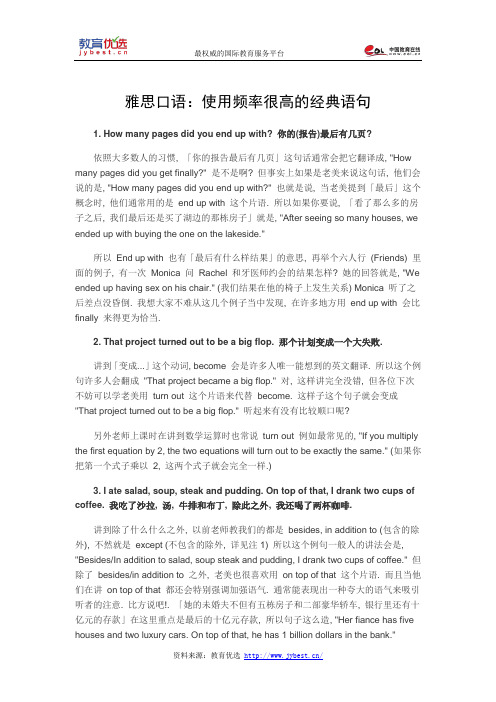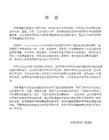雅思口语中与数量有关的句子
- 格式:doc
- 大小:103.22 KB
- 文档页数:2

雅思口语:使用频率很高的经典语句1. How many pages did you end up with? 你的(报告)最后有几页?依照大多数人的习惯, 「你的报告最后有几页」这句话通常会把它翻译成, "How many pages did you get finally?" 是不是啊? 但事实上如果是老美来说这句话, 他们会说的是, "How many pages did you end up with?" 也就是说, 当老美提到「最后」这个概念时, 他们通常用的是end up with 这个片语. 所以如果你要说, 「看了那么多的房子之后, 我们最后还是买了湖边的那栋房子」就是, "After seeing so many houses, we ended up with buying the one on the lakeside."所以End up with 也有「最后有什么样结果」的意思, 再举个六人行(Friends) 里面的例子, 有一次Monica 问Rachel 和牙医师约会的结果怎样? 她的回答就是, "We ended up having sex on his chair." (我们结果在他的椅子上发生关系) Monica 听了之后差点没昏倒. 我想大家不难从这几个例子当中发现, 在许多地方用end up with 会比finally 来得更为恰当.2. That project turned out to be a big flop. 那个计划变成一个大失败.讲到「变成...」这个动词, become 会是许多人唯一能想到的英文翻译. 所以这个例句许多人会翻成"That project became a big flop." 对, 这样讲完全没错, 但各位下次不妨可以学老美用turn out 这个片语来代替become. 这样子这个句子就会变成"That project turned out to be a big flop." 听起来有没有比较顺口呢?另外老师上课时在讲到数学运算时也常说turn out 例如最常见的, "If you multiply the first equation by 2, the two equations will turn out to be exactly the same." (如果你把第一个式子乘以2, 这两个式子就会完全一样.)3. I ate salad, soup, steak and pudding. On top of that, I drank two cups of coffee. 我吃了沙拉, 汤, 牛排和布丁, 除此之外, 我还喝了两杯咖啡.讲到除了什么什么之外, 以前老师教我们的都是besides, in addition to (包含的除外), 不然就是except (不包含的除外, 详见注1) 所以这个例句一般人的讲法会是, "Besides/In addition to salad, soup steak and pudding, I drank two cups of coffee." 但除了besides/in addition to 之外, 老美也很喜欢用on top of that 这个片语. 而且当他们在讲on top of that 都还会特别强调加强语气. 通常能表现出一种夸大的语气来吸引听者的注意. 比方说吧!. 「她的未婚夫不但有五栋房子和二部豪华轿车, 银行里还有十亿元的存款」在这里重点是最后的十亿元存款, 所以句子这么造, "Her fiance has five houses and two luxury cars. On top of that, he has 1 billion dollars in the bank."4. We're gonna have two parties back-to-back next weekend. 下周末我们将连续有两场派对.「连续」这个概念在英文中的说法有很多. 最简单的可以用单一副词consecutively, 例如例句就可以翻成"We're gonna have two parties consecutively next weekend." 当然你也可以用片语in a row 或是back-to-back 来替换这个consecutively. In a row原意是排成一列, 例如three days in a row 就是三天排成一列, 也就连续三天的意思. 而back-to-back 字面上则是「背贴背」, 当然也有连续的意思在内. 所以比方说期末考到了, 哇咧, 明天居然连续考三科. 这个用英文说出来就是"We'll have three tests in a row tomorrow." 或是"We'll have three tests back-to-back tomorrow."5. I have another class right after this. 我随后(下一堂)还有课.我刚来美国时常被诸如, 「我随后(下一堂) 还有课」, 「下一辆公车随后就到」这样的句子困扰. 原因是我觉得「随后」如果翻成immediately (马上) 似乎不太对, 但又想不出什么其它替代方案. 后来我才慢慢了解原来「随后」就是用right after 或是right behind. (单指空间上的之后) 所以要是上课时坐隔壁的不帅的男生问你, "Have a cup of coffee with me after class?" (下课后一起去喝杯咖啡吗?) 拒绝他就是, "I'm sorry, but I have another class right after this." (很抱歉耶, 我下一堂还有课.) 或是像有时候公车挤不上去, 司机伯伯就会告诉我, "There is another bus right behind this one." (下一辆公车随后就到.)提醒各位, right 在英文中常常有「马上」的意思, 例如, "I will be right back." 就是我马上回来的意思. 所以如果你去掉right 单说"I have another class after this." 当然也可以, 但意思会变成, 「我之后还有课」(也许是下一堂, 下二堂有课不一定), 但如果是用right after this class 则很明确地指出了是「下一堂」.6. Knock it off. I can't stand this anymore. 停止吧! 我再也不能忍受了.「停止」这个动作在英文中有许多的表示方式, 例如最简单的stop 就是一例, 但是除了简单的stop 之外, 老美也喜欢说, "Knock it off." 或者是"Cut it out." 例如看到两个人在打架, 你可以赶快说, "Knock it off" 或者是"Cut it out." 来劝他们快点住手.Knock off 这个片语还有许多其它的用法, 像是台风把高压线给吹掉了, 在这里你就可以说, "The typhoon knocked the power line off." 或是上数学课时老师说把x 给消去, 这里的消去也可以用knock off 喔. 造个句子就是, "If you knock off x in this equation, you will end up with the final solution." (如果你把x 从这个式子给消去的话, 你就会得到最后的答案.)7. How can we get through this (situation)? 我们要如何度过这个(难关)呢?讲到度过某个困难的时刻, 或许你的直觉反应是要用pass 或是overcome. 但是另外还有一个你想不太到的说法: get through 或是pass through. 例如有一次我搭一个老美的车因超速被警察拦下来, 他就很紧张地说, "How can we get through this?" (结果最后他还是无助地被警察伯伯开了一张罚张.) 或是当有人遭逢不幸, 我就会安慰人家说, "No matter what's going to happen, we will get through this hard time together." (不管再来会发生什么事, 我们都要一起过度难关.)注意一下如果是要讲的是你已经遭遇过的事情, 则过去式got through 和完成式have been through 同样好用. 例如期末考好不容易结束了, 你可以松口气说, "I'm so glad I got through finals week." (我很高兴终于考完了.) 或是"I'm so glad I have been through finals week." (强调"已经"考完了.)8. We have to work this problem out by tomorrow. 我们必须在明天之前解决这个问题.讲到work out 这个动词片语, 它在英文里的用法可是千变万化的. 首先例如解决问题, 老美除了说solve 之外, 也超爱用work out 的, 所以解决一个问题你不但可以说solve a problem, 还可以说work a problem out. 不过有时候还要看看上下文的意思, 如果我说, "Let's work out some plans for the holiday." 这里的work out 翻成解决当然不太恰当, 所以你可以把它翻成「作出来」. 整句的意思就是, 「让我们为假期拟定一些计划」其实work out 不单单可以代表「解决」(solve) 的意思, 或是「作出来」的意思. 它还可以代表「成功」(succeed). 例如你写了一个程式, 但你不知道能不能成功地执行, 你就可以说, "I don't know if this program is gonna work out." (我不知道这个程式会不会成功.) 或是男女朋友交往, 但你觉得你们俩个人不可能有结果, 这句话就是, "I don't feel this relationship is gonna work out."当然啦, 许多人都知道work out 还可以代表运动(exercise) 的意思. (但通常是指在健身房所作的运动), 所以从这里不难看出老美其实很喜欢用一些很简单的单字,例如work out 就可以用来替换比较难的solve 或是succeed.这也算是美国口语上的一种趋势吧!9. I have to work on your name. 我必须练习(发出) 你的名字.讲到这个趋势, 那我再考考大家知不知道practice (练习) 这个字可以用什么字来代替? 想到了没? 答案是用work 就可以代替practice 喔! (通常work 之后会再加上介系词on, 成为work on something) 像是有一个老美问我叫什么名字, 我告诉他我叫"Kun-Lin" 结果他发了两次都发不对, 自己就笑了笑说, "Sorry, I have to work on this one" 其实他想说的就是, "Sorry, I have to practice this one." (很抱歉我必须练习一下.) 的意思啦!跟work out 一样, work on 用在不同的地方就有不同的意思. 像是你去餐厅服务生要收盘子时就会问, "Are you finished or still working on it?" (你吃完了吗? 还是要继续用?) 所以在这里work on 可以当「吃」解释. 但是如果你到医院去, 听到有人说, "The doctor is still working on his patient." (医生还在医治他的病人). Work on 在这里又成了治疗(heal) 的意思. (这个work on 在这里如果翻成「吃」就太可怕了吧! ) 但是我想告诉大家, 虽然work out 和work on 在不同的场合有不同的解释, 但大家不必去死记每一种的解释, 只要看一下上下文, 通常他们的意思都很明显.10. I really need to kick back during the holiday season. 我假期时真的需要好好放松一下.最后讲到relax 这个字, relax 在口语中可以代换成kick back. 听来是不是有点奇怪呢? 但这真的是蛮流行的讲法. 例如我在广播上常听到, "Kick off your shoes and kick back for a while." (脱掉你的鞋子, 好好地放松一下自己.)Kick back 这个片语还有许多其它的意思, 但都跟字面上的意思「踢回去」有关. 例如报复(revenge). "The United States decided to kick back after the incident" (事件发生后, 美国决定要报复.) 或是像拿回扣也是用kick back 喔, 例如, "The company had to kick back a lot to the corrupt officer." (这家公司必须给腐败的政府官员很大一笔佣金)。

雅思小作文倍数的表达以及例句英文回答:To express multiples in IELTS Writing Task 1, you can use various phrases and expressions. Here are some examples:1. "Twice as many/ much as": This phrase is used to describe a comparison of quantities that are double in size. For instance, "The number of tourists visiting the city in 2019 was twice as many as in 2018."2. "Three times more/ greater than": This expression indicates a comparison where one quantity is three times larger than another. For example, "The price of gasoline in the city is three times greater than in the nearby towns."3. "Fourfold increase/ decrease": This phrase is usedto describe a change that is four times larger or smaller. For instance, "There has been a fourfold increase in the number of students studying abroad in the past decade."4. "Tenfold growth/ decline": This expression signifiesa change that is ten times larger or smaller. For example, "The company experienced a tenfold decline in profits due to the economic recession."5. "A significant/ substantial increase/ decrease": These phrases are used to describe a considerable change in quantity. For example, "There has been a significant increase in the number of cars on the road in recent years."中文回答:在雅思写作任务1中,要表达倍数,可以使用各种短语和表达方式。

雅思形容数量多的词汇一、形容词。
1. numerous.- 发音:英[ˈnjuːmərəs];美[ˈnuːmərəs]- 词性:形容词。
- 例句:There are numerous books in the library.(图书馆里有许多书。
)2. plentiful.- 发音:英[ˈplentɪfl];美[ˈplentɪfl]- 词性:形容词。
- 例句:The region has a plentiful supply of water.(这个地区有充足的水源供应。
)3. abundant.- 发音:英[əˈbʌndənt];美[əˈbʌndənt]- 词性:形容词。
- 例句:The forest is abundant in wildlife.(这片森林里有丰富的野生动植物。
)4. ample.- 发音:英[ˈæmpl];美[ˈæmpl]- 词性:形容词。
- 例句:There is ample evidence to support his claim.(有充足的证据支持他的主张。
)5. copious.- 发音:英[ˈkəʊpiəs];美[ˈkoʊpiəs]- 词性:形容词。
- 例句:He took copious notes during the lecture.(他在讲座期间做了大量的笔记。
)二、名词(表示数量多的概念)1. multitude.- 发音:英[ˈmʌltɪtjuːd];美[ˈmʌltɪtuːd]- 词性:名词。
- 例句:A multitude of people gathered in the square.(许多人聚集在广场上。
)2. quantity.- 发音:英[ˈkwɒntəti];美[ˈkwɑːntəti]- 词性:名词。
- 例句:A large quantity of goods were damaged.(大量的货物受损了。
)3. amount.- 发音:英[əˈmaʊnt];美[əˈmaʊnt]- 词性:名词。


雅思写作之常用的数字表达方式
基数词:表示数量多少的数词,比如one(1),two(2),three(3)等。
序数词:表示顺序的数词,比如first(第一),second(第二),third(第三)等。
百分比:表示部分占总数的比例,通常用百分比形式表示。
比如50%表示half,25%表示quarter。
比率:表示两个数之间的比例关系。
比如1:5表示1比5,2:1表示2比1。
数量:表示具体的数量,比如two pounds of sugar表示两磅糖。
约数:表示一个大概的数量,比如about 100表示大约100。
倍数:表示一个数是另一个数的几倍,比如twice表示两倍,three times表示三倍。
小数:表示一个数的一部分,比如0.5表示half,0.25表示quarter。
大写数字:在正式写作中,数字通常使用大写形式表示,比如ONE HUNDRED AND FIFTY-TWO表示152。
这些数字表达方式可以根据具体情况选择使用,以确保写作清晰、准确并符合英语表达习惯。

问数量的英语句子
1.How many apples are there in the basket?
2.Can you tell me the number of students in our class?
3.What is the total population of this city?
4.How much money do you have in your wallet?
5.How many books have you read so far this year?
6.Do you know how many countries are there in the world?
7.Can you count how many cars are parked on the street?
8.What is the average temperature in this region during winter?
9.How many hours did it take you to complete the project?
10.Can you estimate the number of people at the concert?
以上是一些关于数量的英语句子,在不同场合下可以用来询问、探索或评估事物的数量。
使用这些句子可以更准确地了解某种事物的数量,帮助我们更好地了解世界。
使用这些句子时,要注意正确运用语法规则,避免出现语法错误,以保证语言表达的准确性。
同时,要选择合适的时机和场合使用这些句子,以达到交流的目的。
希望以上提供的句子对你有所帮助。
雅思⼝语常见话题——数字&爱好&动物给⼤家分享了Part 1中常见的数字和爱好话题,以及Part 2&3中有关动物的常见话题,同学们可以参考⼀下。
⼀、Part 1 词汇及回答(number & hobby) (1)numbers相关问题 1. Do you have any lucky numbers? lucky meanings: 8/6/9 special/important days:⽣⽇、节⽇ special numbers: ⽐如说520(我爱你)、1314(⼀⽣⼀世)、运动会的号码、考号、车牌号、⼿机号等都可以作为幸运数字。
2. What's your favorite number? 可以参考上⾯幸运数字类型来回答。
3. In your countries does any number have special meanings? Numbers in Chinese culture Lucky numbers are based on Chinese words that sound similar to other Chinese words. The numbe6, 8 and 9 are believed to have auspicious meanings because their names sound similar to words that have positive meanings. 常见数字含义 积极数字含义 6: pronunciation——good for business/happiness/blessing;meaning——smooth going; 8: pronunciation——prosper, wealth, fortune; 9: historical meaning——emperor harmony; pronunciation——long lasting. 消极数字含义 4:pronunciation——death(homophonous),often be skipped 我们回答这个问题的时候,可以从积极数字和消极数字两个⽅⾯来回答,让⾃⼰的内容更加丰富。
有关于数字的英语口语句子学习英语是要有一个过程的哦,,小编今天给大家带来的是英语的口语,学习英语就是要花很多时间的,大家要好好看一看,背一背,这样才可以更快的提升成绩哦。
数字 numbers基数词Cardinal Numberone --- 一two --- 二three --- 三four --- 四five --- 五six --- 六seven --- 七eight --- 八nine --- 九ten --- 十eleven --- 十一twelve --- 十二thirteen --- 十三fourteen --- 十四fifteen --- 十五sixteen --- 十六seventeen --- 十七eighteen --- 十八nineteen --- 十九twenty --- 二十twenty one --- 二十一twenty two --- 二十二twenty three --- 二十三twenty four --- 二十四twenty five --- 二十五twenty six --- 二十六twenty seven --- 二十七twenty eight --- 二十八twenty nine --- 二十九thirty --- 三十thirty one --- 三十一thirty two --- 三十二thirty three --- 三十三thirty four --- 三十四thirty five --- 三十五thirty six --- 三十六thirty seven --- 三十七thirty eight --- 三十八thirty nine --- 三十九forty --- 四十fifty --- 五十sixty --- 六十seventy --- 七十eighty --- 八十ninety --- 九十hundred --- 百thousand --- 千one ten thousand --- 万one hundred thousand --- 十万序数词Ordinal Numberfirst --- 第一second --- 第二third --- 第三fourth --- 第四fifth --- 第五sixth --- 第六seventh --- 第七eighth --- 第八ninth --- 第九tenth --- 第十eleventh --- 第十一twelfth --- 第十二thirteenth --- 第十三fourteenth --- 第十四fifteenth --- 第十五sixteenth --- 第十六seventeenth --- 第十七eighteenth --- 第十八nineteenth --- 第十九twentieth --- 第二十thirtieth --- 第三十hundredth --- 第一百。
数字的口语表达和运用数字在日常口语中扮演着非常重要的角色,我们可以用它们来描述数量、顺序、时间、年龄等等。
在本文中,我们将探讨数字的口语表达和运用,以帮助大家提升口语表达能力。
1. 描述数量在日常交流中,我们经常需要描述数量,比如购物、点餐、计划等等。
以下是一些常用的表达方式:- How many + 名词复数?(有多少……?)例如:How many people are there?(有多少人?)- There are + 数字 + 名词复数。
例如:There are three apples.(有三个苹果。
)- 数字 + 名词复数 + 动词复数。
例如:Three cats are sleeping.(三只猫正在睡觉。
)2. 描述顺序我们经常需要用数字来描述顺序,比如比赛名次、行程安排等等。
以下是一些常用的表达方式:- 第 + 数字 + 名词。
例如:The first place(第一名)- 数字 + 最高级 + 名词单数。
例如:The tallest building(最高的建筑)- 数字 + 编号(例如:第一、第二、第三)。
例如:The third chapter(第三章)3. 时间表达在日常生活中,我们经常用数字来表达时间。
以下是一些常用的表达方式:- 点钟时间:数字+ o'clock。
例如:It's six o'clock.(现在是6点。
)- 分钟时间:数字 + 分钟 + past/to + 数字。
例如:It's ten past five.(现在是5点10分。
)It's twenty to eight.(现在是8点20分。
)- 表示一天中的时间段:数字 + am/pm。
例如:Let's meet at 2 pm.(我们2点见。
)4. 年龄表达当我们谈论年龄时,数字也是不可或缺的。
以下是一些常用的表达方式:- I am + 数字 + years old.(我今年……岁。
雅思小作文分别占百分比表达
在雅思小作文里,表达数据百分比可是个关键技能。
让我给你
几个不同风格、口语化的表达方式,帮你轻松掌握这门技巧。
首先,想强调某个数据占大头时,你可以说,“这个数据简直
是个巨无霸,占了整个比例的百分之六七十,简直是压倒性的优势啊!”你看,这样一说,是不是感觉很有画面感?
然后,当数据占比差不多,不相上下时,你可以轻松点说,
“这两个数据嘛,就像兄弟俩似的,一个占了百分之四十,另一个
百分之三十五,差不多啦,不分伯仲。
”这种方式就显得很随和,
让人一听就懂。
再来说说,当某个数据占比虽小但意义重大时,你可以这样描述,“别看这个数据只占了个百分之十左右,但可是关键中的关键,就像那点睛之笔,让整个画面都活了起来。
”这样的表达,不仅强
调了数据的重要性,还用了点修辞手法,显得更有文采。
最后,当数据变化幅度大,从低占比飙升到高占比时,你可以
兴奋地表示,“哎呀,这个数据可是火箭发射般的飙升啊!从原来
的百分之几一下子涨到了百分之五十多,这增长速度简直让人瞠目结舌!”这样的表达,既突出了数据的增长幅度,又传递出了说话人的情绪。
你看,表达数据百分比也可以这么有趣、这么多样。
掌握了这些口语化的表达方式,你的雅思小作文一定能更生动有趣,让人印象深刻!。
雅思口语中与数量有关的句子
在雅思口语考试中,考生难免会遇到一些与数量有关的句子,下面教育优选就将雅思口语中与数量有关的句子给考生做了一下盘点,希望考生在备考的时候能认真练习。
1. It takes me three clear / cleanly days. 它花了我整整三天时间。
2. There are fifty and odd (or and more) students in our class. 我们班有五十余人。
3. The total expense amount to a hundred dollars. 全部费用合计100 美元。
4. We were fifteen,all told. 我们一共十五人。
5. The delegation consisted of 15,inclusive of (including) two interpreters. 代表团共十五人,包括两名翻译在内。
6. There were fifty people present,not counting (excluding) the children. 出席者达五十人,儿童未计算在内。
7. We take a rest at intervals of two hours. 我们每隔两小时休息一次。
8. I ask you to teach me every other day. 我请你每隔一天来教我。
9. Beijing is ten times as big as my home town. 北京有我的家乡十个那么大。
10. The sun is a huge blazing ball,a million times larger than the earth. 太阳是个庞大的炽燃火球,比地球大一百多万倍。
11. By comparison with 1992,the foreign trade turnover of that country in 2003 increased (to) 3.5 times. 与1992年相比,这个国家2003年对外贸易总额增加了2.5 倍(增加到3.5 倍)。
12. That table measures three feet by three. 那张桌子三英尺长,三英尺宽。
13. He valued the house for me at 500 pound. 这房子他替我作价为三千五百镑。
14. His coat is rated at 20 yuan. 他的大衣值价二十元。
15. The job was finished at a sitting (a stretch). 这工作一下子(一口气)就做完了。
以上内容给考生分享了雅思口语中与数量有关的句子,这些数字的句型在雅思口语备考中是很常用的,希望同学们认真学习。